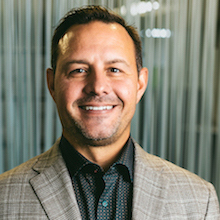In our inaugural HUMALOGY® Trends Report, where we polled leaders around how technology is impacting them and their organizations, we asked these leaders how technology impacted their wellbeing. 85% of leaders said that technology had a negative impact on their wellbeing. Conversely, we recently hosted around 30 students from the Stonecipher School of Business at East Central University (ECU) in Ada, Oklahoma. When we asked these students how technology impacts their wellbeing, 75% of them said it had an overall positive impact on their wellbeing.
The disparity in the numbers between established business leaders and college students around technology and wellbeing is rather noteworthy. It could indicate a generational shift on how individuals view technology on their wellbeing. Digital natives seem to be more comfortable with the use of technology and its impact on their mental health.
Earlier this month, FPOV had the opportunity to host the students from ECU. It gave everyone in the room and opportunity to have a fascinating conversation around technology and how it will shape our future. The office was staged as to demonstrate concepts of the near future, with a deepfake Tom Cruise and AI generated avatar greeting students upon entering the office.
The day was an opportunity for the students to spend some time in a business environment and ask questions about the future of their careers. We attempted to make the time as engaging as possible for the students, who ranged in grades from freshman to senior.
Signup for our Newsletter
We reviewed the core concepts championed by Future Point of View, including HUMALOGY® and RIVERS OF INFORMATION®. We peered into the future to explain how technologies like artificial intelligence (AI) and quantum computing will impact society. We debuted our new Future Forecasting card game, and the students readily accepted the opportunity to play and anticipate risks that might come in the future.
During a game of Future Forecasting, players are dealt two situational cards that contain both an industry and an event. Players begin thinking about hypothetical scenarios in which the event would relate to the industry. Finally, a third card, a result card, is dealt to players along with a set of prompts to answer in front of the group:
- Create a story about the future in which all 3 are connected
- Decide how likely the story is to occur
- Forecast the year in which the story is likely to occur
- Describe what you would do as a leader.
Finally, we asked the students a series of questions around technology adoption that gave us some interesting insights into how young people view technology and its role on society.
We asked the students if they would let AI record everything they say and hear if the data was 100% secure and it meant they had a perfect memory. 62% said they would have ethical concerns and only 3% said “Yes they would, because it would be extremely helpful.” This indicates that students are thoughtful about technology, or at least have seen Black Mirror.
When we asked the students if AI will ever be given rights, 42% said, “No, AIs will never have legal rights.” 45% said, “Maybe they would have rights against abuse.” Only 13% said AI will eventually have rights similar to humans.
The students indicated that if technology helps them work less, they would be willing to sacrifice some face-to-face interaction. 67% said, “Yes, of course” when asked if they would be willing to use more technology and have less human interaction if they could work one hour less per day. Only 18% said no. 15% were unsure.
Finally, the students seemed to find the idea of digital implants a bit frightening. 76% said they would not use digital implants even if it allowed them to work less or make more money.
All of this indicates that the students are genuinely optimistic about technology in their personal lives but are also cautious about personal privacy and the potential invasiveness of digital tools.

About the Author
Hart Brown is the CEO of Future Point of View and the Security and Risk Practice Lead. He is a widely known expert and trusted advisor in the governance of risk and resilience with over 20 years of experience across a broad spectrum of organizations in both the public and private sectors. He is a Certified Ethical Hacker and a Qualified Risk Director. Learn more about Hart Brown.





